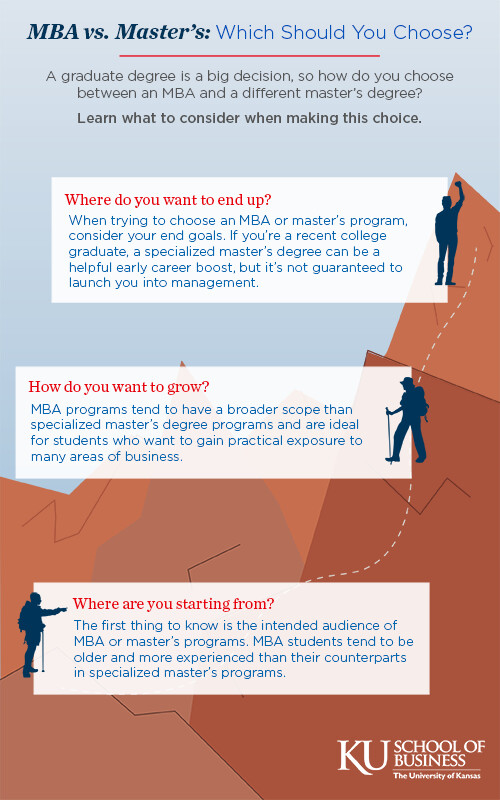An MBA is one of the most popular master’s degrees in the U.S., but it isn’t the only option when it comes to pursuing a master’s degree in business, so you may be wondering, “Why should I get an MBA?”.1 Increasingly, specialized master’s degrees in individual fields like finance and accounting are saturating the graduate education space.2 In the matchup of MBA vs. master’s, there isn’t a clear winner, but understanding your career goals and aspirations will help you to answer, “Should I get an MBA?”
Where Are You Starting From?
The first thing to know is the intended audience of MBA or master’s programs. MBA students tend to be older and more experienced than their counterparts in specialized master’s programs. For this reason, MBA candidates are typically looking to increase practical skills in order to shift or advance their careers, while a specialized master’s degree is a better fit for a recent graduate who’s trying to launch their career into a higher-paying, more focused position.3
How Do You Want to Grow?
MBA programs tend to have a broader scope and are ideal for students who want to gain practical exposure to many areas of business than specialized master’s degree programs. Conversely, specialized master’s degrees offer students the chance to dive deep and gain a stronger theoretical understanding of a specific field.
You should also consider how much time you’re willing to dedicate to your graduate business education. How long does it take to get an MBA vs. the time to completion for a business master’s? Well, because they cover a wider area of study and may require time to incorporate practical experience, MBA programs tend to take two years or more, while master’s degree programs might take as little as 12 to 18 months. Ask yourself whether the time to degree is a crucial factor for you
Where Do You Want to End Up?
When trying to choose an MBA or master’s program, consider your end goals. If you’re a recent college graduate, a specialized master’s degree can be a helpful early career boost, but it’s not guaranteed to launch you into management.4
If you already have some work experience and are looking to advance into a leadership role, an MBA is most likely the better option. The hiring outlook for both degrees is good: Nearly 90% of firms surveyed by the Graduate Management Admission Council plan to hire MBA graduates, compared with around 60% who plan to hire master’s graduates.5
The Bottom Line
The main differences between pursuing an MBA and pursuing a specialized master’s have to do with your current career phase and your expected outcomes. If you’ve recently graduated and want to deepen your focus in a specific area, consider a master’s degree. If you’re an experienced professional looking to move up, launch a new business, or gain greater flexibility to operate effectively in a variety of business areas, the MBA is right for you. And one last bonus: In terms of post-grad starting salaries, MBA grads tend to outearn specialized master’s degree holders by as much as 17%.4
Choosing which path to take can be daunting, but it’s important to consider what each program delivers and how they can impact your future. There’s no better time than now to discover how the online MBA program from the University of Kansas can give you the tools and insight to accelerate your career and put you on the path toward achieving your professional goals.
- Retrieved on March 8, 2019, from fortune.com/2014/05/31/mba-popular-masters-degree/
- Retrieved on March 8, 2019, from investopedia.com/articles/personal-finance/011415/mba-vs-masters-finance.asp
- Retrieved on March 8, 2019, from usnews.com/education/best-graduate-schools/top-business-schools/articles/2013/04/25/decide-between-an-mba-and-ms-at-business-school
- Retrieved on March 8, 2019, from fortune.com/2015/12/08/specialized-business-masters
- Retrieved on March 8, 2019, from gmac.com/market-intelligence-and-research/research-library/employment-outlook/2017-corporate-recruiters-survey-report.aspx


